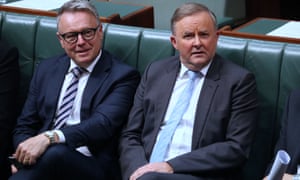Extract from The Guardian
Exclusive: Opposition leader says ‘the Labor’s party’s position is we examine things based upon the detail’
Anthony Albanese has rebuked his shadow resources spokesman, Joel Fitzgibbon, for signalling Labor will sign up to substantial taxpayer underwriting of gas infrastructure, and insists climate change is an “existential threat that we need to take seriously”.
Fitzgibbon declared on Wednesday that Nev Power, the chairman of Scott Morrison’s Covid advisory commission, was on the right path lobbying the government to support a gas-led recovery from the economic shock created by the pandemic – even though a report with concrete recommendations has not been released.
“Our manufacturing sector will remain in decline if we don’t get affordable gas to market and, if we can do so, then we can rejuvenate our manufacturing industry and create jobs,” Fitzgibbon said.
But Albanese told Guardian Australia’s politics podcast Labor won’t be supporting anything sight unseen. “I speak for the Labor party and the Labor’s party’s position is we examine things based upon the detail.”
He said under his leadership, Labor would continue to take the challenge of reducing greenhouse gas emissions seriously.
“I’ve announced net zero emissions by 2050,” he said. “All of the policies that a Labor government that I lead would implement would be consistent with that.
“Action on climate change will actually create jobs and lower energy prices. We need to take climate change seriously”.
Albanese said the Morrison government had taken to contracting out policy development to committees and advisory groups, such as the coordination commission Power – a former Fortescue executive – chairs.
The Labor leader said members of that commission “come into their positions with all of their history and all of their backgrounds, so it’s not surprising that a committee chaired by Nev Power would come up with predictable responses”.
But he said a significant expansion of the gas industry was at odds with the view of the Australian Energy Market Operator, in its latest integrated system plan.
“Under all the scenarios what they say is by 2040, gas will be about 1% of the total electricity market. The total.
“All of their scenarios suggest it will be renewables with storage that will make the real difference. That’s where the expansion will be, that’s where the market will be, indeed there are other prospects for green hydrogen and other potentials.
“So gas is an important part of the market – but if you look at where the growth is going to be, the people who run the energy sector [say it’s not gas].”
Albanese said if the “rumours” were right about the recommendations put to government in a report of a manufacturing taskforce appended to Power’s commission – “this report suggests gas would be viable at $4 a gigajoule, and that’s below production costs … So you are looking at an ongoing subsidy.”
Albanese said Labor would examine the report once it was released, but he said what was required in the energy sector wasn’t fragmented initiatives but “an energy policy framework”.
In a wide-ranging conversation on the podcast, Albanese addressed the challenges of trying to be a constructive opposition during the pandemic while still pursuing the government over responses Labor regards as suboptimal.
The Labor leader said it was a difficult balance to strike because some elements of Labor’s base wanted attacks against Scott Morrison and the government to be more strident, while people more broadly in the community wanted politics as usual dialled down because they wanted governments to succeed, because if governments succeeded, people’s wellbeing would be safeguarded.
“If it was easy, I wouldn’t be the opposition leader,” he said. “I think it is just a matter of staying the course, about being clear about what Labor values are, and one of Labor’s values is to be constructive. Sometimes that is more difficult”.
“Some people say the model of an opposition leader is Tony Abbott. Well, no. That’s the model of a destructive reactionary opposition leader who doesn’t care about institutions, who doesn’t care about the impact [the strategy has] going forward.
“If you behave like that in opposition, you will behave like that when you come into government, and that’s one of the problems with this government.”
Asked whether he was confident he would lead Labor to the next federal election, Albanese said: “I know I will, and I know we will win the next election.”
He said under his leadership the party had met its first electoral test, holding the marginal seat of Eden Monaro at a byelection earlier this year despite Scott Morrison having public support for the government’s handling of the pandemic.
Albanese said Labor would slim down its policy offering for the next election.
“We will narrow our focus but it will be a clear vision with a clear outline of alternatives,” he said. “The next election … will be about the pandemic, and we will be able to say we played a constructive role.”
He said Labor had pushed for lockdowns early to flatten the curve of infections, for wage subsidies to protect jobs, and Labor had also pushed for “a plan for aged care”.
He said as well as the current crisis, the next election would also be about the future. “People vote about the future, and it is Labor that will have a plan for jobs, for secure work, we’ll have a plan for climate change and regional economic development, for social policy that doesn’t leave people behind, for advancing social issues – like what is happening with recognition of First Nations people? So we will be able to put forward a positive agenda.”
He said the government had been in power for nine years but had very few achievements. “I think the Australian people will vote for a positive alternative and I intend to present that alternative whenever the election is called.”

No comments:
Post a Comment